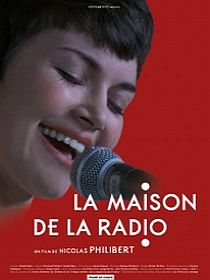


Nicolas Philibert: Maison de la Radio

Voices, yes voices it will be, communicates Philibert right from the start, before the titles appear on the screen. An hommage to the human voice as it is performed in the public radio of France. Quick sound montage, titles, the building that houses the radio from outside, people walking into it, a working day starts. Voilà, simple, classical.
And then faces, yes, faces it will be, very often close-ups of faces, people who are alone in a studio with the microphone very close to their lips, or faces concentrated on listening to voices which are being recorded. Can be literature, news, talk or quiz shows with people who call the radio, or we, the audience, are invited to attend an editorial meeting, what is important, which choices do we make.
Philibert chooses his characters and situations, he goes from one to the next but he comes back and thus give us the illusion of getting to know the characters better. We do and we experience the development they make in
the music recording studio with the opera singer or with the beautiful young singer you see on the poster. Yes, Philibert falls in love with his characters, he has always done so, be it an orangutang (Nenette) or a human being. He is basically an observational documentarian but his presence and influence on the scene he is shooting, mixed with his ambition to make us viewers have ”the feeling of being there” (to quote master Leacock again again again…) makes it impossible to resist the joyful tone that he offers.
He leaves the radio building once in while. He goes with the nerd who records sounds in the nature, and he lets us see and hear the studio recording of the sound of peeling a potato(!) or be with a man, who plays a home-made sound machine, experimental music you might argue, but an artist in action, indeed.
You are in constant good company with this film and for one who enjoys listening to clever people with good language and beautiful voices in the radio (we have that in Denmark as well, in a country where television mostly is tabloid blablabla) during summer time (in the allotment garden), you appreciate the film even more. Having said so, this is not another highlight from Philibert, is does not have many layers but joyful and playful it is, masterly montaged and photographed, that’s quite a lot! You sense that he has enjoyed having been behind the walls of sound!
France, 2013, 100 mins.